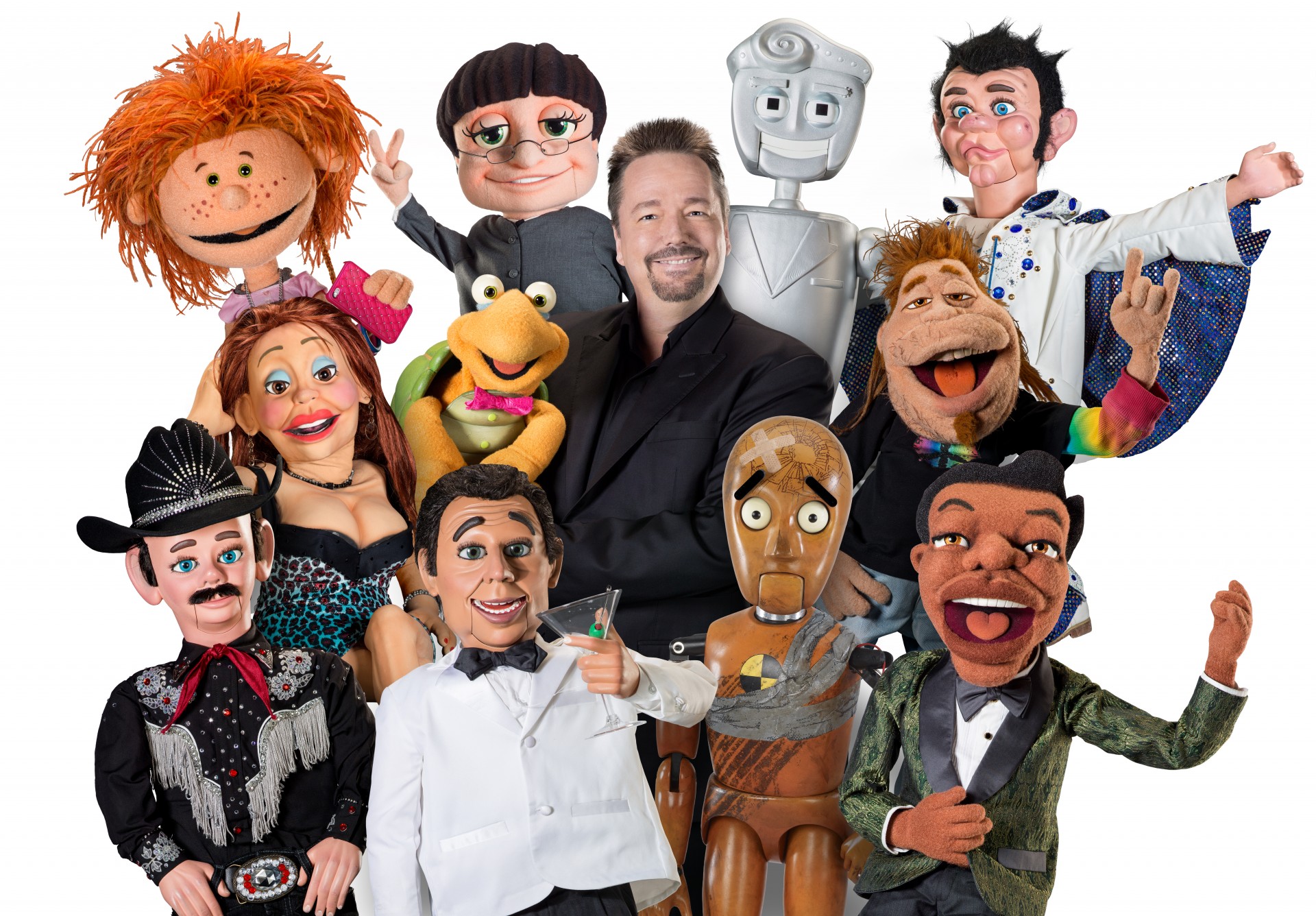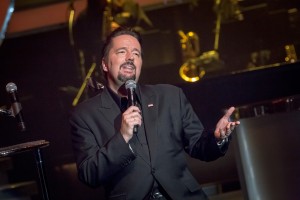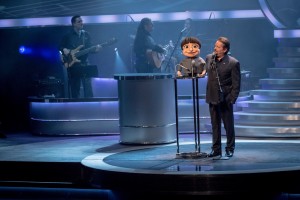
Terry Fator’s Improbable Rise to the Top of the Comedy World
Ten years ago, ventriloquist Terry Fator was making a living on the county fair circuit. Then he ran away from the pack on the second season of America’s Got Talent, took the top prize, and now performs four times a week at The Mirage in Las Vegas—in a theater that bears his name. Forbes named Fator the third top grossing comedian of 2016, behind only Jerry Seinfeld and Kevin Hart. But Fator’s “overnight” success was actually decades in the making. By the time he made it big on AGT, he had given up any dreams of hitting it big, but he never stopped trying to improve to become the greatest ventriloquist ever. That effort has more than paid off.
BY MATT TUTHILL
Robert Irvine Magazine: You debuted a new Donald Trump character in your act. I know you run a family-friendly show. Is it hard to do Trump without using any of the blue material? There’s quite a bit of it to work with.
Terry Fator: Not at all, no. You know, pretty much with anything, if you’re creative, you can figure out a way to tell jokes. For example, I’ve been doing a Michael Jackson routine for years, and I don’t do the routine anymore. I still do an impression of him, but I would do very funny material about Michael Jackson and never once told any of the child molestation jokes. It’s real easy to go there. It’s harder and it takes more creativity not to go there, but for me I like to think of it as a challenge.
I’m not a negative comedian either. I don’t do negative. I do positive, fun, upbeat, entertaining. It’s about really making the audience have a good time. If you’re a Trump supporter, you’re gonna love the routine. If you don’t like Trump, you’re gonna love the routine. That’s the way I write.
RI: There is plenty to play with just using his bluster.
TF: Exactly. It plays more on the thickness of his character. That’s how I do it.
RI: How long do you perform at one of your Vegas shows?
TF: I usually go for about hour and a half. Some people will hire me to do 30 minutes or 40 minutes or whatever. I can certainly do that.
RI: If you go back to your very first audition on AGT, the first thing David Hasselhoff says when he sees you come out with a puppet is, “Oh, no. Not a ventriloquist.” So, you have excelled and made a terrific living off of a performance art that is not really anyone’s favorite. People don’t love ventriloquists, but they love you. So, I have a broad question that goes with that. What kind of satisfaction do you get out of subverting people’s expectations? Because it seems to me the applause that you get is louder and longer because the audience is getting so much more what they expected.
TF: Oh, it’s huge. Absolutely huge. I get an enormous amount of satisfaction. It was a lot of fun. I didn’t actually hear them say that until I saw the video later, but I could see that they were rolling their eyes. And really, it wasn’t that people didn’t necessarily like ventriloquists, it was that people think that ventriloquists is a kid’s thing, or they used to. They don’t anymore. Thank God. I think I’ve really come a long way in changing people’s opinion.
I’m the first ventriloquist in history to have a running performance at a major casino, that signed a major deal. There have been a lot of ventriloquists who have played one-offs or performed afternoon shows, but I’m the first ever to have a night headlining gig. That’s really why I’m changing that. People are now suddenly starting to look at ventriloquists as being possible valid entertainment for adults and for all ages, as opposed to just children. I get a huge amount of satisfaction in knowing that I’m helping change that perception.
RI: And it’s not just a headlining show. They actually call it the Terry Fator Theatre.
TF: Yeah. I have my own theater. It’s amazing how I get compliments from huge stars like Tim Allen. Adam Sandler will come in and be like, “My God. You have your own theater.” It’s like every comedian’s dream having a theater named after you. It’s pretty neat. It’s been that ever since I signed in 2009. I did my first show there February 14, 2009 and it’s been called Terry Fator Theatre ever since then.
RI: There’s this moment in all your videos, right at the end of a song where you’ve got the crowd and they’re going nuts and then you get this huge smile on your face. It looks like you truly love what you’re doing. Did you always love doing it? I know you came upon the idea of being a ventriloquist by chance; you just found a book in your school library.
TF: I’ve always loved it and I’ve always really loved performing. When I was about forty years old I gave up on the whole idea that I was ever gonna hit it big. I thought “Who is ever going to care about a 40-year-old ventriloquist?”
I was a little sad that it felt like the dream had died. My dream of one day making a mark on the ventriloquist community and in the entertainment community was gone. It was a disappointment, but not a devastating type of disappointment because I was so grateful that I still made a living performing. I love performing. I love getting up in front of people. I don’t care if it’s at a party that we’re having where there’s 12 people there. I love to perform. I love to entertain.
RI: How long does it take you to develop a new voice and how much different is that process from doing someone like Trump versus someone where you have to sing a whole song in character, like Cher or Garth Brooks?
TF: Every voice is different. Some voices…it took me, gosh, years to learn how to do Frank Sinatra and Barbra Streisand. It can take from sometimes days, sometimes hours, sometimes years for each voice. If I decide I want to do a voice, I will figure it out. I will work on that voice until I have it. With Frank Sinatra and Barbara Streisand it took 10 whole years to get there.
RI: When Forbes says you’re the highest earning comedian behind Jerry Seinfeld and Kevin Hart, what do you think when you hear that news? Or did you already know that you had entered that stratosphere?
TF: No. I don’t think in terms like that. I know this sounds nutty, but money is not important to me. I mean, obviously it is because we all need money. For me though, money is a means to an end to be able to do the kind of show I want and not to have the shackles. I’ve come up with dozens of ideas throughout my career and thought, “Boy. There’s just no way I could ever do this because I can’t afford it.” To me the money means that if I come up with an idea, I can do it. No matter what. That means much more to me than money. I never dreamed I would be at the top three of the Forbes list. That’s nuts. But it never was a goal of mine. I didn’t know I was in Forbes. They called me and told me I was on there.
I feel like money is incredibly replaceable and it’s just not a big motivating factor to me. It was never a big deal to me, which is why I donate so much to charity. I have no desire to be the richest man in the world. I have no desire to be a billionaire. Couldn’t care less. I just want to make sure that I have been able take care of my family, myself, and then do the best job I can for my fans.
RI: Did you ever have doubts about pursuing ventriloquism seriously? What was plan B? And if so, how far did you get with plan B?
TF: You know, there never was a plan B. I would not have been a depressed and sad person if I had played county fairs for the rest of my life. I was happy. For me, there never was another option to do anything other than entertaining.
RI: Well, I would say that there’s a pretty clear lesson in there for everyone no matter what they’re doing. If you really are loving what you do, and you’re sending out that energy, it comes back to you. There’s so many people who don’t like what they’re doing in one job, they find another, and they don’t like that either..
TF: It’s true. When I was kid, I worked as a janitor for my parent’s janitorial business. But I also sang in my community center because I enjoyed it. For me, if you’re doing something because you want to be rich one day, you’re gonna be so frustrated. Your whole life is gonna be frustrating. Just do what you love to do and be happy if you pay bills. I was. I was just glad that I was able to pay my mortgage and keep my car payments up, make sure I kept the food on the table, electricity.
Don’t get me wrong. I love it. I love being able to go out and buy whatever electronics, the newest fad, it’s fun for me. But if all of that is gone tomorrow, as long as I’m able to perform, I would be a happy person.
RI: When you first picked up the book on ventriloquism in your school library, how old were you?
TF: Ten years old.
RI: Did you go to college or did you just go whole hog into performance art?
TF: I went to college and realized pretty early on that it wasn’t for me. I took one year of college. I did drama. I majored in drama and I minored in public radio. Obviously I had that goal of being an entertainer. I’m glad because I’ve learned so much even in that one year of drama. To this day I still use techniques that I learned that year.
I didn’t really care what I was doing as long as I was being an entertainer. I had tried magic. I did hypnosis for a while. As long as I was in front of people entertaining them, making them laugh, and having a good time, I was happy.
RI: A lot of people will pursue so-called “safe” careers. What advice would you give to someone who wants to pursue something that nobody around them is pursuing?
TF: My advice is never stop working to toward things that you feel passionate about. It’s okay to give up on the dream of whatever your angle might be. For example, you say, “I want to be a professor at Harvard or say it’s a teacher or a singer. I want to be rich and famous. I want to win a Grammy. It’s fine for you to give up on that dream and realize that that dream may never happen. But it’s never fine to stop working toward the dream.
So, I don’t care if you’re 60 years old. As soon as that guitar goes into the garage and you never pick it up again, the dream dies. If you work 15 minutes a day on something, 20 years later you’re gonna be pretty doggone good at that. Whatever it is. Just never stop working toward it.
It’s okay to give up and feel like I did when I was 40, but I still worked at my craft. Then when the opportunity presented itself to me through America’s Got Talent, I was ready. If I had stopped working on my craft and said, “Oh well, I’ll just work at Taco Bell now,” it never would have happened for me. The only reason it did happen was because I was ready when the opportunity presented itself because I never stopped working on the dream. That’s really my advice. Never stop working on the dream.
Like Robert, Terry gives generously to military charities; the two often appear at the same benefits, such as the Snowball Express, a celebration for children of fallen soldiers. Terry says he is constantly tinkering with his Vegas show to add more characters and bit to keep it fresh. Click HERE to learn more and buy tickets.



